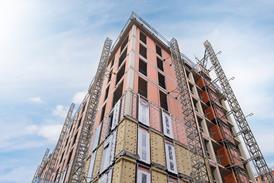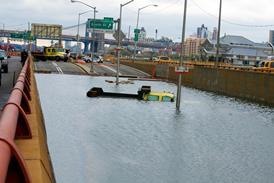Blow to government’s off-site building plans as Arup warns Leeds housing block could fall down in severe weather
The government’s drive to bring in modern methods of construction has suffered a setback after it emerged that one of the UK’s highest profile modular schemes is to be evacuated amid fears it could fall down in severe weather conditions.
Residents at the Joseph Rowntree Foundation’s 46-unit CASPAR scheme in Leeds, built by Japanese contractor Kajima, have been told to move out because of faults in the building.
A report by consultant Arup for Kajima has recommended that the city-centre site be evacuated in the next three months, as there is a 2% chance that the whole structure will collapse in high winds. Arup’s report also advised that a more detailed structural survey should be undertaken.
The news comes at a time when the government has made off-site construction central to its policy goal of sustainably building 200,000 extra homes by 2016.
The CASPAR scheme in Leeds, completed six years ago, was one of two modular housing schemes developed by the Joseph Rowntree Foundation to pilot then-emerging off-site construction methods and provide low-cost apartments for single urbanites.
Lord Best, the chairman of the JRF, said if Arup reported that the cost of repairing CASPAR was excessive, the JRF would consider demolishing the whole scheme.
He said: “After Arup has done its report we will have to decide whether to take it forward or whether we’ll have to demolish.”
Lord Best said that the residents would be moving out and that Kajima was shouldering the costs of compensating residents. The contractor is also picking up the bill for the loss of rent to the JRF. The total cost is not in the millions but could rise depending on the results of Arup’s detailed report.
Lord Best said every precaution had to be taken to protect the residents: “Although there is no imminent danger, freak weather conditions – of which we would get sufficient notice to evacuate the building – might possibly mean part of the building being blown down.”
He said the evacuation was essential to allow Arup’s site investigation to take place. “When the results are known we’ll consider the position with Kajima.”
There are some difficulties with this project, which we will fully investigate
Kajima spokesperson
Best added that the experience had made him more cautious about the use of off-site construction.
He said: “Although it is a well-received development with a constant waiting list, the use of modern methods of construction for this development is creating serious difficulties. The wider lesson we have learned from this experience is that it does not pay to be too ambitious in pioneering modern methods of construction, which are now becoming more fashionable.”
Best said this form of construction was at the cutting edge of building technology and the results had been disappointing. He said: “The builders accept that the responsibility is theirs and that they must put everything right.”
Economist Kate Barker’s report on housing supply last year ordered an industry-wide review into off-site construction under Westbury chief executive Ashley Lane. This has been brought forward by a year because the government is anxious to find out if the method works.
The first CASPAR scheme, built by Sisk in Birmingham, has not encountered problems.
A Kajima spokesperson said: “We are working in close partnership with the Joseph Rowntree Foundation to find the best possible solution in the shortest possible time.
“There are some difficulties with this project, the nature of which we will fully investigate once the flats are empty, in order to lessen any impacts and disruption to residents.
“Engineers have advised us that there is no imminent danger.”
Lord Best on off-site construction…
“The wider lesson we have learned from this experience is that it does not pay to be too ambitious in pioneering modern methods of construction, which are now becoming more fashionable"
























No comments yet